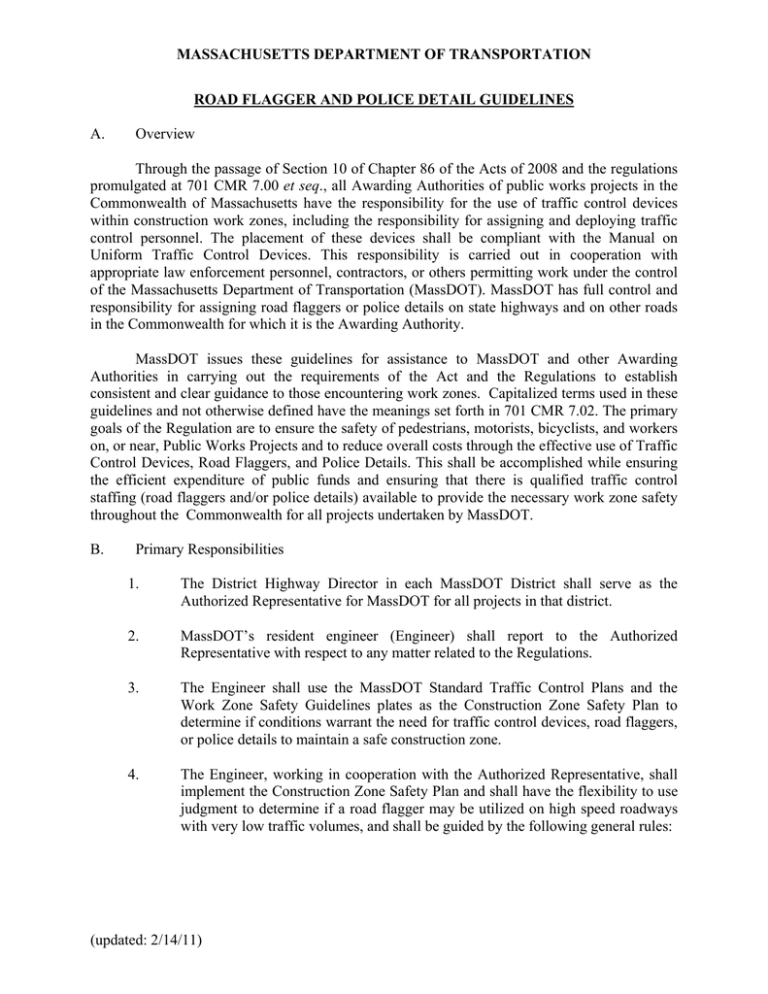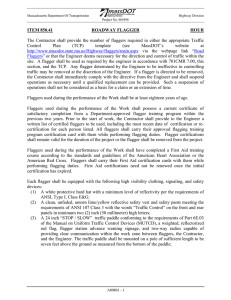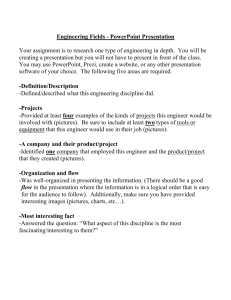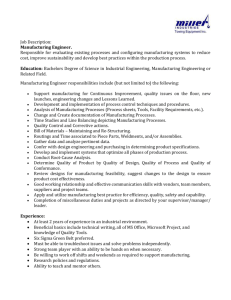MASSACHUSETTS DEPARTMENT OF TRANSPORTATION ROAD FLAGGER AND POLICE DETAIL GUIDELINES A.
advertisement

MASSACHUSETTS DEPARTMENT OF TRANSPORTATION ROAD FLAGGER AND POLICE DETAIL GUIDELINES A. Overview Through the passage of Section 10 of Chapter 86 of the Acts of 2008 and the regulations promulgated at 701 CMR 7.00 et seq., all Awarding Authorities of public works projects in the Commonwealth of Massachusetts have the responsibility for the use of traffic control devices within construction work zones, including the responsibility for assigning and deploying traffic control personnel. The placement of these devices shall be compliant with the Manual on Uniform Traffic Control Devices. This responsibility is carried out in cooperation with appropriate law enforcement personnel, contractors, or others permitting work under the control of the Massachusetts Department of Transportation (MassDOT). MassDOT has full control and responsibility for assigning road flaggers or police details on state highways and on other roads in the Commonwealth for which it is the Awarding Authority. MassDOT issues these guidelines for assistance to MassDOT and other Awarding Authorities in carrying out the requirements of the Act and the Regulations to establish consistent and clear guidance to those encountering work zones. Capitalized terms used in these guidelines and not otherwise defined have the meanings set forth in 701 CMR 7.02. The primary goals of the Regulation are to ensure the safety of pedestrians, motorists, bicyclists, and workers on, or near, Public Works Projects and to reduce overall costs through the effective use of Traffic Control Devices, Road Flaggers, and Police Details. This shall be accomplished while ensuring the efficient expenditure of public funds and ensuring that there is qualified traffic control staffing (road flaggers and/or police details) available to provide the necessary work zone safety throughout the Commonwealth for all projects undertaken by MassDOT. B. Primary Responsibilities 1. The District Highway Director in each MassDOT District shall serve as the Authorized Representative for MassDOT for all projects in that district. 2. MassDOT’s resident engineer (Engineer) shall report to the Authorized Representative with respect to any matter related to the Regulations. 3. The Engineer shall use the MassDOT Standard Traffic Control Plans and the Work Zone Safety Guidelines plates as the Construction Zone Safety Plan to determine if conditions warrant the need for traffic control devices, road flaggers, or police details to maintain a safe construction zone. 4. The Engineer, working in cooperation with the Authorized Representative, shall implement the Construction Zone Safety Plan and shall have the flexibility to use judgment to determine if a road flagger may be utilized on high speed roadways with very low traffic volumes, and shall be guided by the following general rules: (updated: 2/14/11) MASSACHUSETTS DEPARTMENT OF TRANSPORTATION • • • • • • • • • • • • The use of road flaggers shall primarily be restricted to low speed, low volume roadways Flaggers may also be utilized on roads with a high speed designation provided that the traffic volumes are sufficiently low as determined by the Engineer Details are customarily used to provide additional visibility on high speed roadways (specifically freeways) primarily due to the presence of the cruiser and flashing blue lights to protect the work zone If conditions warrant, and as directed by the Engineer, the detail officer shall work outside of his or her vehicle providing required traffic control and direction to assist in the operations within the work zone The locations of road flaggers and/or police details are designated on the plates for Traffic Control Plans, and Work Zone Safety Guidelines, or as directed by the Engineer Road flaggers and/or police details may be utilized to install the initial set-ups for longterm and intermediate-term construction work zones as defined in plates INT1 through MLR2. It shall be the responsibility and sole authority of the Engineer to determine the number of road flaggers and/or police details necessary to install these setups The Low Speed Roadway is considered a roadway with a legal speed of less than 45 miles per hour within the limits of the construction zone The High Speed Roadway is considered a roadway with a legal speed equal to or greater than 45 miles per hour within the limits of the construction zone The Engineer shall consider a High Speed Roadway, as defined above, to qualify as a Low Speed Roadway if the traffic volumes are very low (less than 4000 ADT a day). If there is a combination of the set-ups necessary for the operation of the project, the Engineer shall review the set-ups in these plates to determine the final number of traffic control staff needed in the construction zone The Engineer may choose to use a combination of road flaggers and police details as conditions warrant Should a police organization be unable to fill a requested police detail, the Engineer shall exercise the option of utilizing a certified road flagger in lieu of utilizing the services of another community, or part-time and auxiliary details that may not be deemed as qualified 5. C. Should the Engineer determine that speeds through the work zones are in excess of the speed limits, she/he shall have the option to request a speed enforcement Setup for the work zone on an intermittent basis, with the approval of the Authorized Representative. Setups and the Use of MassDOT Traffic Control Plans For ease of locating the proper set-ups, the plates are broken down into the following categories: Standard Traffic Control Plans Intersection Int = Two Lane Roadway TLR = Divided Highway Div = (updated: 2/14/11) Work Zone Safety Guidelines Stationary Operations S= Mobile Operations M= Emergency Response E= MASSACHUSETTS DEPARTMENT OF TRANSPORTATION Brg = R= Ped = D= RR = MLR = Bridge Ramp Pedestrian Crossing Detour Signing Railroad Crossing Multi-Lane Roadway TS = Traffic Signal Repair The Standard Traffic Control Plans and Work Zone Safety Guidelines (“plates”) provide guidance on recommended traffic management Setups for a construction zone, and include the suggested location of traffic control personnel. These plates can be used as part of the design plan for a construction project, or as standard construction zone safety plans for maintenance operations. The plates are available on the MassDOT website (www.massdot.state.ma.us), in District Offices, or may be obtained by contacting the MassDOT State Traffic Engineer’s Office at (617) 973-7800. D. Certification of Road Flaggers on MassDOT Projects In accordance with the Regulation, road flaggers and/or police details shall be qualified or possess the minimum required certification to provide the necessary services, and shall remain on site for the entire shift requested by the Engineer. Road flaggers and/or police details shall be properly equipped and physically able to perform the required duties. E. Work Site Conditions and Control of the Work In accordance with the Act and Regulation, only the Engineer may cancel an operation. That cancellation will be subject to weather conditions resulting in restricted sight distance or hazardous road conditions. If a road flagger and/or police detail fails to stay until the Engineer determines that an operation shall be cancelled, or is completed, then this will result in a forfeiture of the minimum pay requirement and compensation only for the time spent at the jobsite. In the event that there is a disagreement between the Engineer and another entity (i.e., the Community, Police Department, or Contractor) on the number of traffic control personnel (road flaggers and/or police details) required for the safety of the work site, the matter shall be immediately referred to the Authorized Representative for resolution. In accordance with the Regulation, should the Community request additional road flagger and/or police detail assignments beyond what has been determined by the Engineer as safe and effective, the Community will be responsible for full payment for the increase in staffing. Prior to the increase in traffic control staffing, the Community shall submit a letter to the Engineer with a commitment to make the necessary payment for the increase in services rendered. Should a Contractor express a need for additional road flaggers and/or police details due to a specific operation, he/she shall discuss the reasoning with the Engineer, and if agreement is reached, the additional road flaggers and/or police details shall be provided. If there is no agreement, the (updated: 2/14/11) MASSACHUSETTS DEPARTMENT OF TRANSPORTATION Contractor may request in writing the hiring of additional road flaggers and/or police details with a commitment to make the necessary payment for the increase in traffic control staffing. F. Road Flagger and Police Detail Responsibilities The following Guidance shall be employed by Road Flaggers and Police Details employed on MassDOT work zones: Road Flaggers and Police Personnel Shall: • Be aware of and visible to oncoming traffic to perform the required traffic control as directed by the Engineer • Stand facing traffic unless otherwise directed or authorized by the Engineer • Remain out of any vehicle at all times • Wear proper field uniform, with ANSI approved outerwear • Position themselves throughout the site as directed by the Engineer • Arrive and depart at times posted and/or prescribed by the Engineer • Provide for safe movement of traffic through their assigned area, in accordance with the approved Traffic Control Plan • Receive and communicate specific instructions clearly and firmly • Understand and apply safe traffic control practices, recognize dangerous traffic situations, and warn workers in sufficient time to avoid injury • The use of cell phones during operations is considered a distraction and is strictly prohibited Vehicles used as Traffic Control Devices shall: • Have working emergency lighting activated only when directed by the Engineer; at all other times the lighting shall be turned off • Be conspicuously and strategically placed between oncoming traffic and the work site as determined by the Engineer • Be properly fueled prior to arriving at the construction zone Hours: • Overlapping Traffic Police Detail hours with scheduled working hours is strictly prohibited • If the road flagger and/or police detail arrives late, leaves early, or is terminated from the site by a supervisor or the Engineer for improper performance, the road flagger and/or police detail shall be paid only for actual hours worked • Breaks shall be taken at scheduled times in conjunction with contractor’s scheduled breaks (as long as the construction zone is considered safe without a road flagger and/or police detail present), and out of public view whenever possible Training: • To work any type of MassDOT project, Traffic Police Details shall receive training in work zone safety according to the Highway Work Zone Safety Guidelines for Massachusetts Municipalities and Contractors (updated: 2/14/11) MASSACHUSETTS DEPARTMENT OF TRANSPORTATION • • To work any type of MassDOT project, road flaggers must pass a MassDOT approved certification program and carry that certification on their person at all times Road flaggers must also have approved basic first aid training (updated: 2/14/11)



